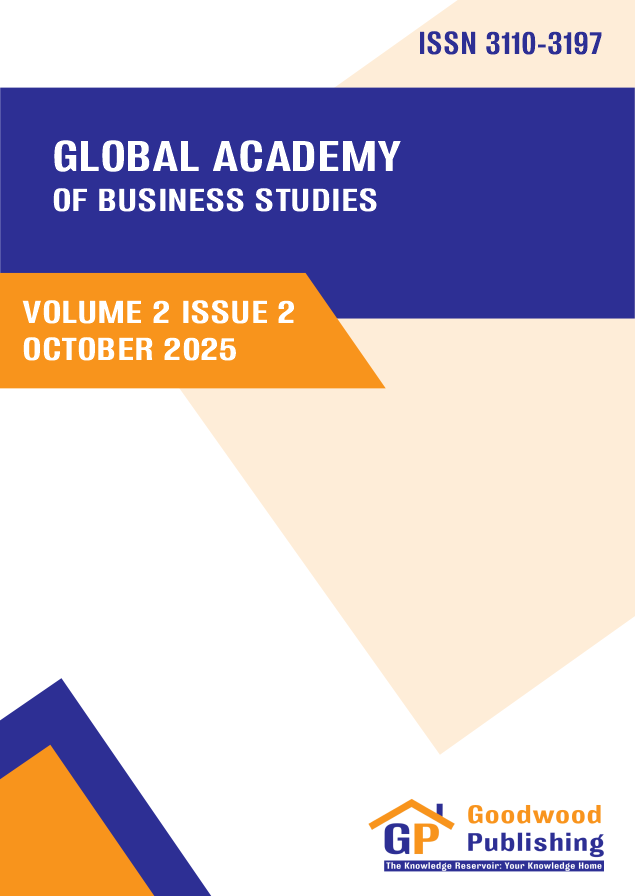Article Details
Vol. 2 No. 2 (2025): October
Analysis of factors that are the challenges of digital transformation in public service complaint management through the SP4N-LAPOR! Application in the Ombudsman of the Republic of Indonesia
Abstract
Purpose: This study aims to analyze the challenging factors in the digital transformation of public service complaint management through the SP4N-LAPOR! Application at the Ombudsman of the Republic of Indonesia.
Methodology/approach: The research adopts a quantitative approach, collecting data through interviews and questionnaires from employees/assistant managers of SP4N-LAPOR! at the Ombudsman of the Republic of Indonesia. Exploratory Factor Analysis (EFA) serves as the analytical method to identify the primary factors influencing difficulties and challenges in the digital transformation process.
Results/findings: The analysis reveals several challenging factors in the digital transformation of managing public service complaints through the SP4N-LAPOR! Application at the Indonesian Ombudsman. The identified challenge factors, ranging from the most dominant to less prominent, include Digital Capability, Information Network Systems, Complaint Management, Digital Solutions, Leadership 4.0, Business Ecosystem, Integrated Regulation, Digital Talent, Digital Conversion and Digital Implementation.
Conclusion: Digital transformation of complaint management at the Ombudsman of Indonesia faces major challenges, notably limited digital capability (34.93%), hindering SP4N-LAPOR! implementation effectiveness and overall public service efficiency.
Limitations: This research aimed to identify factors challenging the digital transformation of public service complaint management, providing a foundation for future studies to develop effective strategies for improvement. However, the study’s respondents were limited to employees or assistants of the Ombudsman of the Republic of Indonesia, restricting broader generalization.
Contribution: This article contributes to a comprehensive understanding of critical aspects essential for improving the implementation of digital transformation in managing public service complaints.
Keywords
How to Cite
Download Citation
References
- Astuti, A. A. (2022). An Analysis of Indonesian Public Service Reform Through National Public Service Complaint Management Policy. Journal of Public Policy and Administration, 6(1), 5-11. doi:https://doi.org/10.11648/j.jppa.20220601.12
- Ayuningtiyas, F. (2022). Implikasi Pemerintah Terkait Pelayanan Publik Secara Online dalam Perspektif Hukum Administrasi Negara. Education: Jurnal Sosial Humaniora dan Pendidikan, 2(3), 48-57. doi:https://doi.org/10.51903/education.v2i3.259
- Bloomberg, J. (2018). Digitization, Digitalization, and Digital Transformation: Confuse Them at Your Peril. Forbes, 28, 1-6.
- Bobro, N., Lisova, R., Parfentieva, O., Dmytrovska, V., & Kyrylenko, S. (2025). Digital Transformation for Cost Optimisation and Sustainable Business Operations. European journal of sustainable development, 14(2), 158-172. doi:https://doi.org/10.14207/ejsd.2025.v14n2p158
- Firican, D. A. (2023). Digital Transformation and Digital Culture: A Literature Review of the Digital Cultural Attributes to Enable Digital Transformation. Proceedings of the International Conference on Business Excellence, 17(1), 791-799. doi:https://doi.org/10.2478/picbe-2023-0073
- Govers, M., & Amelsvoort, P. v. (2023). A Theoretical Essay on Socio-Technical Systems Design Thinking in the Era of Digital Transformation. Gruppe Interaktion Organisation Zeitschrift für Angewandte Organisationspsychologie (GIO), 54(1), 27-40. doi:https://doi.org/10.1007/s11612-023-00675-8
- Habibullah, A. (2010). Kajian Pemanfaatan dan Pengembangan E-Government. Jurnal Ilmu Administrasi Negara, 3(3), 187-195.
- Hanelt, A., Bohnsack, R., Marz, D., & Antunes Marante, C. (2021). A Systematic Review of the Literature on Digital Transformation: Insights and Implications for Strategy and Organizational Change. Journal of Management Studies, 58(5), 1159-1197. doi:https://doi.org/10.1111/joms.12639
- Hendarsyah, D. (2020). Pemasaran Digital dalam Kewirausahaan. IQTISHADUNA: Jurnal Ilmiah Ekonomi Kita, 9(1), 25-43. doi:https://doi.org/10.46367/iqtishaduna.v9i1.209
- Hinings, B., Gegenhuber, T., & Greenwood, R. (2018). Digital Innovation and Transformation: An Institutional Perspective. Information and Organization, 28(1), 52-61. doi:https://doi.org/10.1016/j.infoandorg.2018.02.004
- Indiyati, D., Kurniawan, A., & Choirunnisa, M. (2018). Lingkungan Kerja Dan Motivasi Kerja Pada Perusahaan Manufaktur Untuk Mendukung Pariwisata Indonesia. Jurnal Pariwisata, 5(3), 203-212. doi:https://doi.org/10.31294/par.v5i3.4436
- Irawan, B. (2017). E-Government Sebagai Bentuk Baru dalam Pelayanan Publik: Sebuah Tinjauan Teoritik. Jurnal Paradigma, 4(3), 200-209. doi:http://dx.doi.org/10.30872/jp.v4i3.419
- Irawan, B., & Saputro, A. (2020). Penerapan Pelayanan Publik Berbasis Teknologi Informasi Melalui Web Domain di Kota Surakarta. The Indonesian Journal of Public Administration (IJPA), 6(2), 59-67. doi:https://doi.org/10.52447/ijpa.v6i2.4386
- Lessig, L. (2009). Code and Other Laws of Cyberspace. New York: Basic Books.
- Loonam, J., Eaves, S., Kumar, V., & Parry, G. (2018). Towards Digital Transformation: Lessons Learned from Traditional Organizations. Strategic Change, 27(2), 101-109. doi:https://doi.org/10.1002/jsc.2185
- Nasura, M. D. (2025). Reformasi Birokrasi di Indonesia: Menuju Pelayanan Publik yang Berpusat pada Rakyat. Prosiding Seminar Nasional Fakultas Ilmu Sosial dan Ilmu Politik, 2(1), 676-693. doi:https://doi.org/10.24929/semnasfisip.v2i1.4115
- Norliani, Sari, M. N., Safarudin, M. S., Jaya, R., Baharuddin, & Nugraha, A. R. (2024). Transformasi Digital dan Dampaknya pada Organisasi: Tinjauan Terhadap Implementasi Teknologi Informatika. Jurnal Review Pendidikan dan Pengajaran (JRPP), 7(3), 10779-10787. doi:https://doi.org/10.31004/jrpp.v7i3.31987
- Nurhikmah, A. H., & Fasa, M. I. (2024). Upaya Transformasi Digital dalam Meningkatkan Kepuasan Nasabah Melalui Strategi Pemasaran Online (Studi pada Generasi Milenial). Jurnal Media Akademik (JMA), 2(10), 1-15. doi:https://doi.org/10.62281/v2i10.844
- Osmundsen, K., Iden, J., & Bygstad, B. (2018). Digital Transformation: Drivers, Success Factors, and Implications. 12th Mediterranean Conference on Information Systems (MCIS), 37.
- Panjaitan, W. J., & Lupiana, F. (2023). Penerapan Tranformasi Digital dan Hambatannya pada Industri Kuliner di Indonesia. Jurnal Riset Manajemen Dan Ekonomi (JRIME), 1(2), 278-301. doi:https://doi.org/10.54066/jrime.v1i2.650
- Pohan, A. A., & Yosepha, S. Y. (2025). Dampak Jam Kerja Fleksibel Terhadap Motivasi, Kepuasan, dan Kinerja Pegawai Setjen MPR-RI. Reviu Akuntansi, Manajemen, dan Bisnis, 5(1), 59-76. doi:https://doi.org/10.35912/rambis.v5i1.4650
- Sanjaya, R., Wibisono, C., & Sajiyo, S. (2024). The Influence of Bureaucratic Leadership Style, Work Culture, and Work Discipline on the Performance of Employees of the Riau Islands Provincial Secretariat with Work Motivation as an Intervening Variable. Journal of Multidisciplinary Academic and Practice Studies, 2(4), 235-254. doi:https://doi.org/10.35912/jomaps.v2i4.2496
- Sugiyono. (2017). Metode Penelitian Kuantitatif, Kualitatif dan R&D. Bandung: Alfabeta.
- Wulandari, A. R., Arvi, A. A., Iqbal, M. I., Tyas, F., Kurniawan, I., & Anshori, M. I. (2023). Digital HR: Digital Transformation in Increasing Productivity in the Work Environment. Jurnal Publikasi Ilmu Manajemen, 2(4), 29-42. doi:https://doi.org/10.55606/jupiman.v2i4.2729
- Yulianto, E., & Wulandari, A. (2025). Dampak Perkembangan E-Commerce Terhadap Industri Jasa Transportasi dan Logistik di Era Digital. Jurnal Pengabdian Indonesia (JPI), 1(2), 352-365. doi:https://doi.org/10.62567/jpi.v1i2.724

